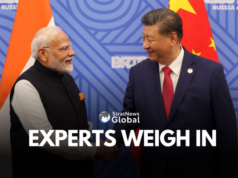The sudden spike in violence in Pakistan’s biggest province of Balochistan is actually a continuation of what has been going on for many years, says Commander Alok Bansal, Director of the India Foundation think tank in Delhi.
He was a guest on The Gist, analysing the situation in Balochistan, a province rich in gas and minerals apart from being the nerve centre of CPEC, the China Pakistan Economic Corridor.
“The violence started from Aug 23rd, 24th night and peaked on the night of 24th-26th, which is the anniversary of the death of Nawab Akbar Bugti who was killed by the Pakistani military in 2006,” Bansal explained.
“The attacks spanned virtually the length and breadth of Balochistan. There was a railway bridge from the colonial era which was blown up in Bolan disrupting train services from Quetta to Sind and Punjab.”
Another railway track connecting to Iran was blown up, there were attacks on police stations and Levies (locally recruited paramilitary forces), and a lot of arms were looted by the Baloch rebels.
Perhaps the most significant attack was the targeting of Punjabis, 23 of whom were offloaded from buses and trucks, their documents scrutinised to determine their identity, and then shot. Total 73 people were killed.
“There were also instances where security personnel or naval personnel who were coming back to rejoin duty were pulled down and shot dead,” Bansal said, adding “This attack is significant because there were so many attacks on one night across the length and breadth of Balochistan.”
In that sense, the 73 people killed is a change in the Baloch strategy which largely focused on road links, railway links, pipelines, electricity lines, so that security forces would not be able to operate easily away from their bases. The idea behind the attacks on infrastructure was to physically disconnect Balochistan from the rest of Pakistan.
Thirty eight years in journalism, widely travelled, history buff with a preference for Old Monk Rum. Current interest/focus spans China, Technology and Trade. Recent reads: Steven Colls Directorate S and Alexander Frater's Chasing the Monsoon. Netflix/Prime video junkie. Loves animal videos on Facebook. Reluctant tweeter.




